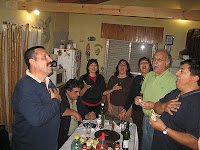I am staying for a few nights near Limbe (an hour-ish from Cap Haitien). Last night I worked at the cholera treatment unit here. Today my coordinator and I met with Doctors without Borders to discuss possibilities for collaboration in Bayeux a village an hour from here. I also facilitated communication between my Haitian and Dominican colleagues to get a shipment of cholera supplies on Sunday, communicated with future volunteers about airport closures and flight cancellations due to the roadblocks and demonstrations that started today. And then, when I thought that after supper remained only sleep (after getting 2 hours in the past 36), I found out that we would be gathering with some of the volunteers that have come to work with the cholera patients.
It was lovely. We sang Christmas carols, read the story of Jesus' love for Mary and Martha and his weeping with them in their sorrow just before the resurrection of Lazarus. We heard from a sermon that addressed why Jesus weeps and where he is in moments of death and suffering. As we sang the carols, we kept on finding ones that were about cholera. I'm not kidding! Now, maybe if you haven't been working many dark, tiring nights battling death and dehydration, you won't see the songs in the same way. But here are a few verses:
O Come, O Come Emmanuel
O come, thou Dayspring, come and cheer
Our spirits by thine advent here;
disperse the gloomy clouds of night,
And death's dark shadows put to flight.
Joy to the World
No more let sins and sorrows grow
Nor thorns infest the ground.
He comes to make his blessings flow
Far as the curse is found.
(Cholera would be the "thorns" that are literally infesting the ground and seeping into the drinking water.)
Okay, there were more but my brain is no longer functioning. Good night!




















































